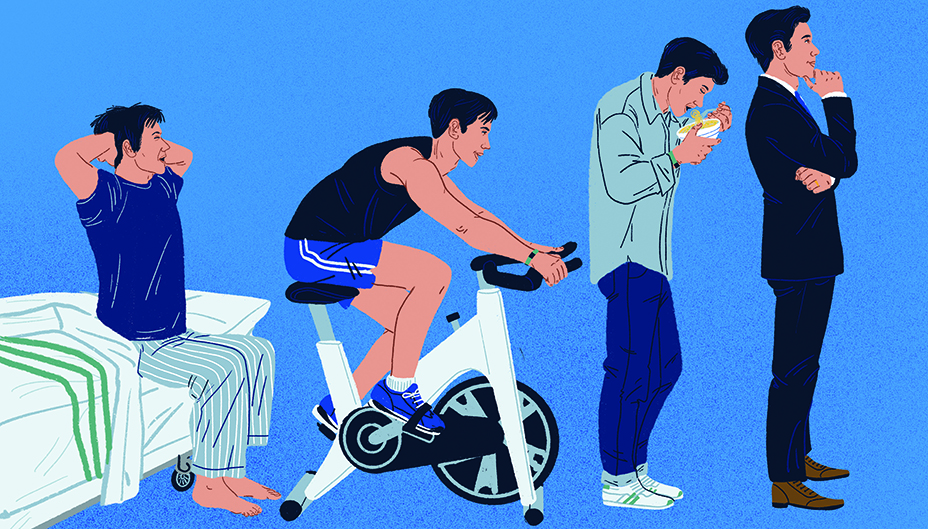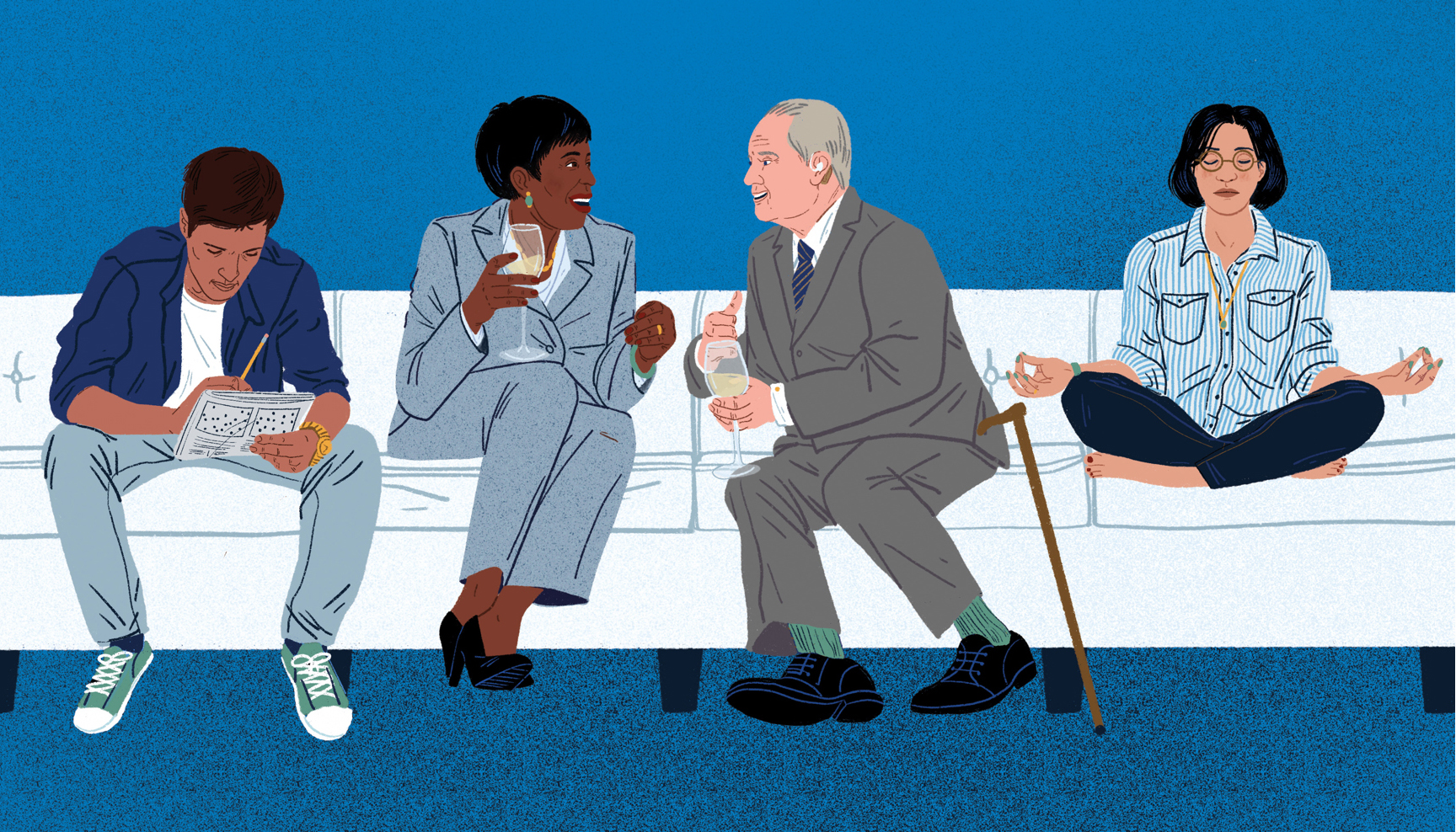How to Sleep, Move and Eat Your Way to Savvier Decisions
Written by Kate Daley
Published on February 6, 2020
minute read
Share:
Venture capitalist Michele Romanow compares entrepreneurship to a high-impact sport, and she trains accordingly. Brian Scudamore, the founder of 1-800-GOT-JUNK?, gets his best ideas on his high-performance exercise bike. Braden Ream, a successful CEO in his 20s, avoids making key decisions after 8 p.m. and gets seven hours of sleep a night — when he can! (Click here to learn more about how they do it.)
According to current research, these are not coincidences. Our brainpower is affected by many lifestyle choices — from what we eat and how much we exercise to whether we spend our spare time socializing or sleeping. So it's no surprise that highly successful people leverage lifestyle to help their minds perform at their best. Let's take a look at how you can, too.
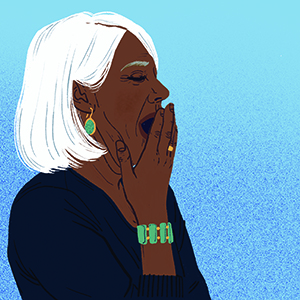
Sleep on it
Does your day always feel a few hours too short? You'll make better headway on your task list if you get the optimal amount of shut-eye, according to sleep experts.
“Most of us think we get more sleep than we actually do,” says Adrian Owen, a neuroscientist and professor at The Brain and Mind Institute at Western University in London, Ont. Owen and his team conducted the world's largest sleep study and found that half of the 40,000-plus participants typically slept less than 6.3 hours per night.
Adults need at least an hour to two hours more. Those who slept seven to eight hours a night performed best on a series of tests, explains Owen. “If you sleep four hours a night, your cognitive performance is equivalent to a normal sleeper who is 10 years older than you.” Surprisingly, the research showed that too much sleep can impair cognition, too. “Twelve hours of sleep is as bad for you as four hours of sleep,” says Owen.
The wrong amount of sleep doesn't just give you a foggy feeling — it actually has an effect on your brain, specifically the frontal lobe. That's the area that controls your decision-making. “Where there was a massive effect was in people's ability to problem-solve and reason,” says Owen. He adds, “Every day we make hundreds of decisions that involve some reasoning.”
There was some good news from this study. “For people who generally don't get enough sleep, it turned out that a single good night's sleep actually helps them bounce almost right back,” says Owen. The evidence is clear: Hit the sack and you'll be more productive and better able to maximize opportunities the next day.
You Are What You Eat
Most brain health advice sounds pretty similar to heart health advice, and there's a reason. Everything you do to maintain your heart and your blood vessels also helps supply blood to the brain, says Carol Greenwood, professor emeritus in the Department of Nutritional Sciences at the University of Toronto and co-author of Canada's first Brain Health Food Guide.
Your diet plays a big role. How do you eat your way to a better brain? Stick to a meal plan that's largely plant-based, recommends Greenwood. Think green veggies (including cruciferous ones like broccoli and kale) and fruits (antioxidant-rich produce like berries and pomegranates). Add some foods with healthy fats, such as fish, nuts and olive oil. “You're going to get a good mix of nutrients when you're eating lots of fruits and vegetables. They'll supply you with vitamins and minerals, but also all of the other good things,” says Greenwood. And by that she means the superpowers of antioxidants.
The brain is a highly vascular and metabolic organ, meaning it needs lots of blood and nutrients, says Teresa Liu-Ambrose, the Canada Research Chair in Physical Activity, Mobility and Cognitive Neuroscience at the University of British Columbia. And it can benefit from those antioxidant-rich berries you noshed on for breakfast. Antioxidants fight cell damage and inflammation, which helps keep blood vessels healthy and promote blood flow. Greenwood describes the system as a highway for supplying nutrients and removing waste.
What not to eat? Limit red meat, processed foods, and sweets like pop and candy. These foods are often loaded with salt, saturated fats and sugar, and they're also low in fibre. All of that can be detrimental to brain health. (Sigh...don't pass the doughnuts.) And don't neglect your fitness — maintaining your brain requires a combo effort of diet and exercise.
Notably, as you age, your peak cognitive performance shifts from the afternoon to the morning, explains Greenwood. So if you notice that you're in a slump at 3 p.m., it's not the best time to make important choices. If you want to make a trade right before the market closes, have a healthy snack (like an apple) first — it can help boost your brain processes, such as reasoning and attention span.
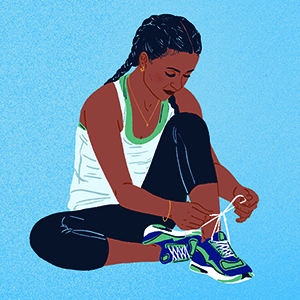
Work It Out
Ready to hit the gym? Exercise plays an important role in both maintaining neuroplasticity (your brain's ability to form neural connections) and expanding your cognitive reserve (your brain's ability to function despite damage or age-related deterioration), says Liu-Ambrose.
Both cardio and strength training affect the brain, but in different ways. Cardio, or aerobic exercise, impacts your hippocampus, one of your brain's memory centres. Strength training, also called resistance training, might help minimize age-related damage to your white matter, the nerve fibres that make up the central nervous system and support your cognitive, sensory and motor functions.
Whether you enjoy a long run or prefer a quick and sweaty High Intensity Interval Training (HIIT) workout, it's important to maintain your fitness long-term. Cognitive impairment doesn't happen overnight, explains Liu-Ambrose. It starts progressing from your 40s, so adopting a healthy lifestyle in midlife (if you haven't already) is key. Think of cognitive reserve the way you think of retirement savings, she suggests: “The earlier you start, the more buffer you have.”
If you need to get focused for a big day ahead or to make important financial decisions, break a sweat. “There are definitely acute benefits to exercise,” says Liu-Ambrose. After a workout, you'll see an immediate boost in both cognitive skills and memory. Try to push yourself — a leisurely half-hour on the elliptical is better than nothing, but it's not ideal. “Intensity of training does matter,” says Liu-Ambrose. “You're trying to improve your cardiovascular or your muscle strength.”
Improve Your Return on Investment
The experts agree: It's not just one area, but a combination of exercise, diet and a good night's sleep that keeps your mind running at max capacity. Put these ideas into practice and you'll be on your way to savvier, sharper decision-making.
More Ways to Boost Your BrainpowerTry these healthy mind habits to further improve your critical thinking.
1. Play Mind Games 2. Get Social (the Other Social) Have an invite to a networking event? A family get-together coming up? A friend throwing a shindig? Whatever it is, RSVP “yes” — socializing has been shown to help preserve memory and positively influence brain aging. An Ohio State University study found that mice that lived in groups had healthier brains and better memories than those that lived in pairs. In addition, the mice in groups had younger-looking brains with less inflammation, leading the researchers to theorize that having a larger social network can benefit our brains as we age. 3. Find Ways to Decompress Stress can take a toll on the body — and that includes the brain. One recent study of more than 2,000 participants showed that people in their 40s and 50s with high levels of the stress hormone cortisol may have issues with their memory and cognition. That same study found that higher cortisol levels may even shrink your brain. Lowering stress through mindfulness meditation may help take that cortisol down a few notches and strengthen your executive function, which includes attention span and memory. For those of us who can't escape the everyday for a full-on meditation retreat, we can try a mindfulness app, yoga or tai chi, all proven strategies to dial down those stress levels. |
This article was featured in our special issue, as seen in the Globe and Mail. Download the full magazine HERE.
RBC Direct Investing Inc. and Royal Bank of Canada are separate corporate entities which are affiliated. RBC Direct Investing Inc. is a wholly owned subsidiary of Royal Bank of Canada and is a Member of the Canadian Investment Regulatory Organization and the Canadian Investor Protection Fund. Royal Bank of Canada and certain of its issuers are related to RBC Direct Investing Inc. RBC Direct Investing Inc. does not provide investment advice or recommendations regarding the purchase or sale of any securities. Investors are responsible for their own investment decisions. RBC Direct Investing is a business name used by RBC Direct Investing Inc. ® / ™ Trademark(s) of Royal Bank of Canada. RBC and Royal Bank are registered trademarks of Royal Bank of Canada. Used under licence.
© Royal Bank of Canada 2025.
Any information, opinions or views provided in this document, including hyperlinks to the RBC Direct Investing Inc. website or the websites of its affiliates or third parties, are for your general information only, and are not intended to provide legal, investment, financial, accounting, tax or other professional advice. While information presented is believed to be factual and current, its accuracy is not guaranteed and it should not be regarded as a complete analysis of the subjects discussed. All expressions of opinion reflect the judgment of the author(s) as of the date of publication and are subject to change. No endorsement of any third parties or their advice, opinions, information, products or services is expressly given or implied by RBC Direct Investing Inc. or its affiliates. You should consult with your advisor before taking any action based upon the information contained in this document.
Furthermore, the products, services and securities referred to in this publication are only available in Canada and other jurisdictions where they may be legally offered for sale. Information available on the RBC Direct Investing website is intended for access by residents of Canada only, and should not be accessed from any jurisdiction outside Canada.
Explore More
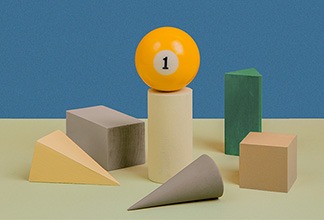
The Hidden Costs of Being Single
How single Canadians can build wealth on their own terms
minute read

What Investors Can Learn from Hockey Star and RBC Olympian Sarah Nurse
Nurse's path to the podium reveals how preparation, planning and practice can turn potential into a golden opportunity
minute read
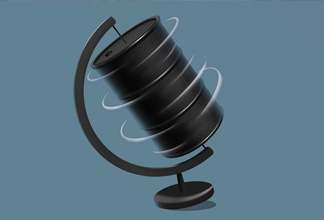
Crude Questions? A Look at Canada’s Oil Economy
What you need to know about Canada’s oil industry
minute read
Inspired Investor brings you personal stories, timely information and expert insights to empower your investment decisions. Visit About Us to find out more.


